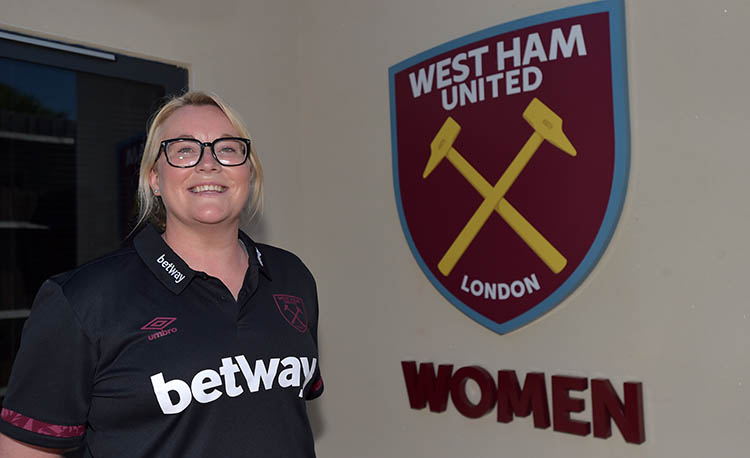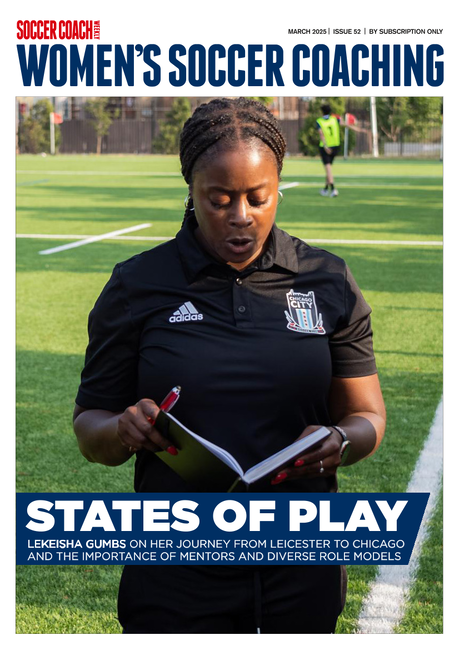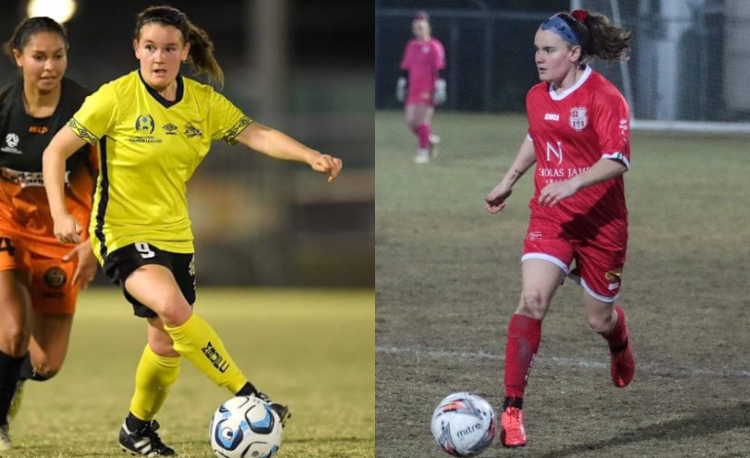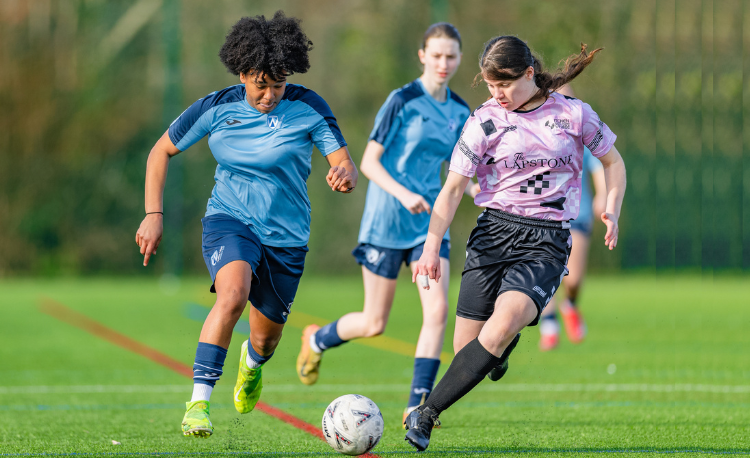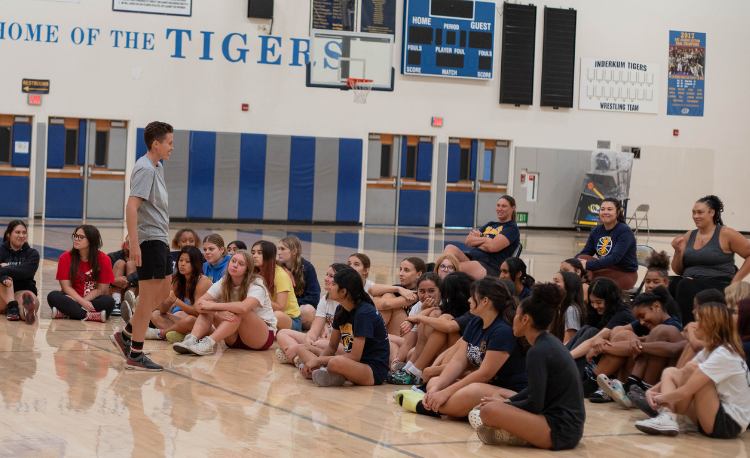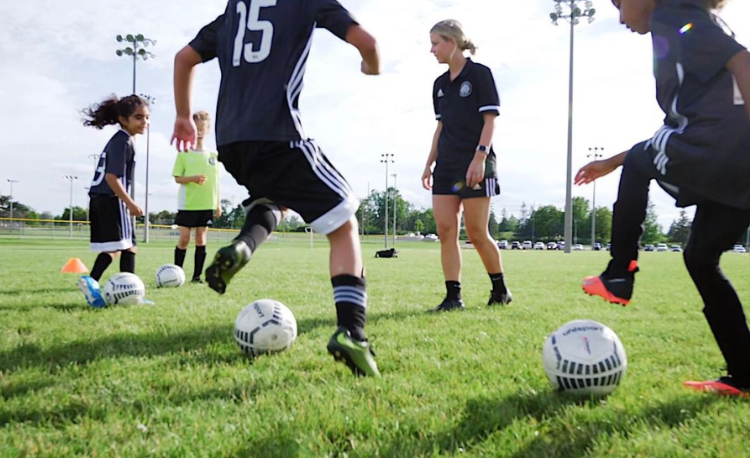You are viewing
2 of your 3 free articles
Wellbeing: the art of listening and sharing
Hannah Duncan talks to West Ham United Women’s Jenny Coe about how the personal touch is boosting player performance in a diverse dressing room
In 2021, Jenny Coe was appointed to a full-time role at West Ham United Women as head of performance and wellbeing.
It was certainly a statement from the London-based Women’s Super League club. Putting wellbeing in Coe’s title ensured it was front and centre of the club’s agenda, with a strategy, workplan, performance indicators and a budget.
A former international basketball player for Ireland, Coe joined UK Coaching in 2018, supporting coaches in 13 Olympic sports on their respective journeys.
WSC spoke with her about the West Ham role and the importance of looking after players in the modern game...
WSC: What does your job entail?
JC: "With this evolving concept of performance through wellbeing, my job role spans a broad range of areas.
"I manage the multidisciplinary team and the extended support team. We really want to get to the point where everyone feels supported, has clarity on their role and feels valued as part of this team.
"Connection is also important, so we as a collective are as informed as we can be on the decisions we make.
"Another part of my role is support for players and staff around mental health, wellbeing and mental-skills training. I work with the players and staff on the education of these areas and, where necessary, signpost people for further support.
"These come in the form of one-to-ones, group meetings, workshops and pitchside support. The final part of my role is coach development."
WSC: How do you support players?
JC: "We are trying to create a space where people can freely share their thoughts and concerns.
"The player is a person first and they have life issues, as we all do, outside their professional football career. I listen, share, and provide space for players to connect with each other, the staff and to have time to navigate the information they must consume and process daily.
"We are all on a journey together and so we all have a responsibility to look after each other and enhance the experience that people have when we are together."
"A player is a person first and they have life issues outside of their football career..."
WSC: Why is it important for clubs to have someone focusing on this area, particularly in the modern game?
JC: "Performance and the measure of success over the years has been linked to wins and points on the board.
"It is important we see beyond this and expand our measures of success.
"We speak about personal bests, being a role model, connecting and inspiring the community and overcoming adversity. I have seen the importance of this across all ages of different sports and at different stages of the pathway.
"The idea is we check in with the people in front of us, how they are arriving at your session, what else is going on in their life, why are they there and what are their goals.
"That initial welcome is so important when they come through a door to your training facility. You are front of stage with greeting, engaging and priming the day.
"In our team at West Ham, we have lots of people who have moved from different clubs, from different countries and we are culturally diverse. So it is important that we know them all as people and get to know what lens they are seeing and experiencing the game and life through.
"This can be as simple as a conversation, a daily wellness check-in, a group fun session or some mini projects."
WSC: What pressures from soccer and the world beyond that can commonly affect players?
JC: "The interesting thing about pressure is that it is the person’s perception of the pressure and the ‘thoughts about the thoughts’ that are what can build things into a bigger, unmanageable picture.
"Expectations on performance and appearance, and how to manage them, are usually at the forefront.
"At all levels, players are going to hear ‘Go score a goal’, ‘Did you win?’, ‘How much playing time did you get?’, ‘Go out there and turn the game around’.
"The expectations can come from coaches, managers, parents, social media, the fans - and this can be a rough terrain to navigate. To monitor and manage this, we are mindful that every conversation counts.
"The perception of demand on a player can shift with just one word or action, as can their perception of their own ability.
"This fluctuation can have a big impact on a player. So again, there’s a lot of work around our language and behaviour and how that impacts performance.
"This can be incorporated into feedback and reflection sessions as well as informal conversations."
Related Files
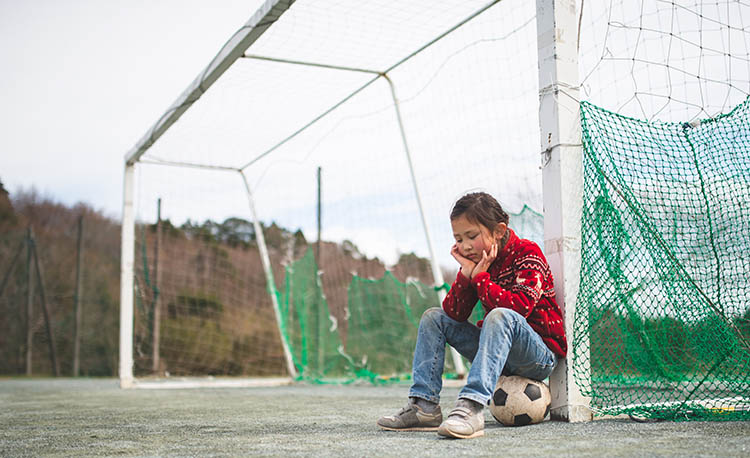
WSC: Does supporting male and female players around wellbeing look slightly different?
JC: "I think this question is an interesting one. For me the initial answer is no. Male and female players are still human beings and each have their own individual needs.
"Historically, these topics were not open for discussion and therefore we didn’t know how to share or introduce a topic until it came out in a catastrophic event.
"Sports and society are doing a better job to accept that, for the benefit of everyone and a happy, healthier way of being, it’s important to talk. The platform sport gives means its influence and impact can reach more people.
"Things like wellbeing, mental health and even sports psychology are still in the process of becoming a more integrated part of the performance support team, but we are seeing more and more campaigns and initiatives to have more conversations.
"The question to ask ourselves is - how free can people be in our team to speak their mind and share? Are there things that haven’t been spoken about which need to be introduced or revisited?
"For example, I now hear coaches speaking with teams and athletes about menstruation and the physiological impact it has on female athletes."
WSC: Finally, what advice would you give to coaches when it comes to supporting players’ wellbeing?
JC: "A few key things stand out here - firstly, knowing what wellbeing is and looks like in your environment.
"Monitoring is a good start; we do daily wellness questionnaires to understand how people are doing before they begin training.
"Then there’s conversations - whether it’s informal conversations to connect or using the results of the wellness questionnaire as a vehicle for conversation.
"It’s not always a dip in performance that signals poor wellbeing..."
"The signs will then appear in the form of language and behaviours. It’s not always a dip in performance that signals poor
wellbeing, so knowing the person in front of you will allow you to keep your finger on the pulse of each relationship you are nourishing.
"Another key part is the work we do on development plans, which provide opportunities for conversations to happen with your athletes, for them to stay focused and for you to monitor any changes or delays in their progress.
"We also ask questions linked to sleep quality, mood and fatigue on a daily basis before the athletes come on site here at West Ham, but this could be done before a session if you don’t have regular contact.
"It’s important to have safeguarding courses so you can pick up key information there. I’ve taken my mental health first-aid training and that was very informative.
"As much as social media can play a negative role in our lives, there are some great benefits of having the opportunity to connect worldwide with people in all areas of performance. This can help you check the lens you are seeing things through.
"If your network is entirely within football, look beyond the bubble. If possible, post-Covid, visit other sports and listen to the language - what do you see, what do you feel when you are there, what can you hear?
"It doesn’t mean that what you’re doing is wrong or right, it’s different. This check and challenge is healthy.
"Finally, not many coaches hear that they are doing a great job so here’s my message to you: Thank you, for inspiring the future of the sport and keeping young people falling in love with physical activities.
"Look beyond gender and age and keep fun in your sessions. We are never too old to laugh."
Newsletter Sign Up
Newsletter Sign Up
Discover the simple way to become a more effective, more successful soccer coach
In a recent survey 89% of subscribers said Women's Soccer Coaching makes them more confident, 91% said Women's Soccer Coaching makes them a more effective coach and 93% said Women's Soccer Coaching makes them more inspired.
*includes 3 coaching manuals
Get Inspired
All the latest techniques and approaches
Women's Soccer Coaching offers proven and easy to use soccer drills, coaching sessions, practice plans, small-sided games, warm-ups, training tips and advice.
We've been at the cutting edge of soccer coaching since we launched Soccer Coach Weekly in 2007, creating resources for the grassroots youth coach, following best practice from around the world and insights from the professional game.
